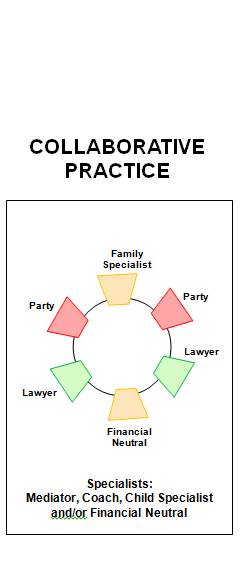A closer look at Collaborative Practice
Friday, 29 November, 2019

Divorce and separation are life changing events. Most people will be touched by divorce in one way or another throughout their lives. We, as family lawyers, see firsthand the difficulty and uncertainty people face when going through a relationship breakdown. Separation not only affects the parties going through it, but their children, families and friends.
Read moreThe Participation Agreement
Monday, 1 April, 2019

The disqualification provision in the Collaborative Practice Participation Agreement is the distinguishing characteristic of the Collaborative Process from other dispute resolution processes.
Read moreThink of the children!
Wednesday, 11 July, 2018

Separation can often lead to feelings of bitterness and resentment between parents.
Read moreWhy Choose Collaborative Practice
Wednesday, 28 February, 2018

Increasing delays in the Family Law litigation and high legal costs have led lawyers and their clients to consider an alternate way of resolving family law disputes.
Read moreThe Collaborative Process for Prenuptial Financial Agreements
Wednesday, 31 January, 2018
Using Collaborative Practice for Prenuptial Financial Agreements a couple's relationship can be strengthened by identifying concerns and working through them to mutually acceptable arrangements. This can strengthen the relationship and increase the couple's ability to work together in the future when issues inevitably arise.
Read moreHow to tell the former partner about Collaborative Practice
Monday, 18 September, 2017

How to tell your former partner about Collaborative Practice is always important
Read moreInterdisciplinary Collaborative Practice
Thursday, 4 May, 2017

Interdisciplinary Collaborative Practice offers the opportunity for families going through relationship breakdown to access the right professionals that best suit their needs. Interdisciplinary Collaborative Practice offers a flexible holistic team response to family breakdown. Interdisciplinary Collaborative Practice recognises the need for families to be given the assistance of professionals from differing disciplines including child and Family consultants, psychologists, financial planners or accountants and lawyers, to resolve their dispute without the need for Court.
Read moreThe Role of a Family Relationship Consultant
Thursday, 6 April, 2017

The best way for people who are divorcing to resolve any disputes is to use a Collaborative professional team.
Read morePreserve Relationships
Friday, 9 December, 2016
Preserving Your Relationships with Collaborative Practice
Read moreHow is Collaborative Practice different from Litigation?
Thursday, 24 November, 2016

Collaborative Practice is a process which resolves conflict without going to court.
Read more